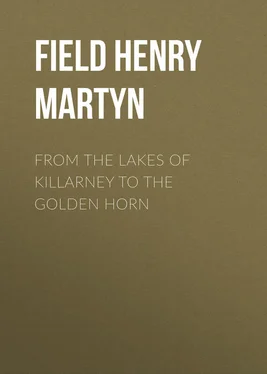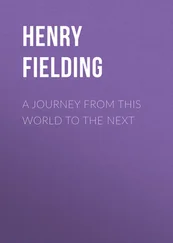Henry Field - From the Lakes of Killarney to the Golden Horn
Здесь есть возможность читать онлайн «Henry Field - From the Lakes of Killarney to the Golden Horn» — ознакомительный отрывок электронной книги совершенно бесплатно, а после прочтения отрывка купить полную версию. В некоторых случаях можно слушать аудио, скачать через торрент в формате fb2 и присутствует краткое содержание. Жанр: foreign_antique, foreign_prose, Путешествия и география, на английском языке. Описание произведения, (предисловие) а так же отзывы посетителей доступны на портале библиотеки ЛибКат.
- Название:From the Lakes of Killarney to the Golden Horn
- Автор:
- Жанр:
- Год:неизвестен
- ISBN:нет данных
- Рейтинг книги:5 / 5. Голосов: 1
-
Избранное:Добавить в избранное
- Отзывы:
-
Ваша оценка:
- 100
- 1
- 2
- 3
- 4
- 5
From the Lakes of Killarney to the Golden Horn: краткое содержание, описание и аннотация
Предлагаем к чтению аннотацию, описание, краткое содержание или предисловие (зависит от того, что написал сам автор книги «From the Lakes of Killarney to the Golden Horn»). Если вы не нашли необходимую информацию о книге — напишите в комментариях, мы постараемся отыскать её.
From the Lakes of Killarney to the Golden Horn — читать онлайн ознакомительный отрывок
Ниже представлен текст книги, разбитый по страницам. Система сохранения места последней прочитанной страницы, позволяет с удобством читать онлайн бесплатно книгу «From the Lakes of Killarney to the Golden Horn», без необходимости каждый раз заново искать на чём Вы остановились. Поставьте закладку, и сможете в любой момент перейти на страницу, на которой закончили чтение.
Интервал:
Закладка:
Finally, as a practical homily and piece of advice to all who are going abroad, let me say, if you would have the fullest enjoyment, take a young person with you – if possible, one who is untravelled, so that you can see the world again with fresh eyes. I came away in the deepest depression. Nothing has comforted me so much as a light figure always at my side. Poor child! The watching, and care, and sorrow that she has had for these many months, had driven the roses from her cheeks; but now they are coming back again. She has never been abroad before. To her literally "all things are new." The sun rises daily on a new world. She enters into everything with the utmost zest. She was a very good sailor, and enjoyed the voyage, and made friends with everybody. Really it brought a thrill of pleasure for the first time into my poor heart to see her delight. She will be the best of companions in all my wanderings.
In such good company, we have passed over the great and wide sea, and now set foot upon the land, thanking Him who has led us safely through the mighty waters. Yesterday morning, after the English service had been read in the saloon, Dr. Schaff gave out the hymn,
Nearer, my God, to Thee,
and my heart responded fervently to the prayer, that all the experiences of this mortal state, on the sea and on the land – the storms of the ocean and the storms of life – may serve this one supreme object of existence, to bring us nearer to God.
CHAPTER II.
IRELAND – ITS BEAUTY AND ITS SADNESS
There is never but one first impression; all else is second in time and in degree. It is twenty-eight years since I first saw the shores of England and of Ireland, and then they were to me like some celestial country. It was then, as now, in the blessed spring-time – in the merry month of May:
The corn was springing fresh and green,
The lark sang loud and high;
and the banks of the Mersey, as I sailed up to Liverpool, were like the golden shores of Paradise.
Now I am somewhat of a traveller, and should take these things more quietly, were it not for a pair of young eyes beside me, through which I see things anew, and taste again the sweetness of that earlier time. If we had landed in the moon, my companion could not have been at first more bewildered and delighted with what she saw; everything was so queer and quaint, so old and strange – in a word, so unlike all she had ever seen before. The streets were different, being very narrow, and winding up hill and down dale; the houses were different, standing close up to the street, without the relief of grass, or lawn, or even of stately ascending steps in front; the thatched cottages and the flowering hedge-rows – all were new.
To heighten the impression of what was so fresh to the eye, the country was in its most beautiful season. We left New York still looking cold and cheerless from the backward spring; here the spring had burst into its full glory. The ivy mantled every old tower and ruin with the richest green, the hawthorn was in blossom, making the hedge-rows, as we whirled along the roads, a mass of white and green, filling the eye with its beauty and the air with its fragrance. Thus there was an intoxication of the senses, as well as of the imagination; and if the girls (for two others, under the charge of Prof. Hyde, had joined our party) had leaped from the carriage, and commenced a romp or a dance on the greensward, we could hardly have been surprised, as an expression of their childish joy, and their first greeting as they touched the soil, not of merry England, but of the Emerald Isle.
But if this set them off into such ecstasies, what shall be said of their first sight of a ruin? Of course it was Blarney Castle, which is near Cork, and famous for its Blarney Stone. A lordly castle, indeed, it must have been in the days of its pride, as it still towers up a hundred feet and more, and its walls are eight or ten feet thick: so that it would have lasted for ages, if Cromwell had not knocked some ugly holes through it a little more than two hundred years ago. But still the tower is beautiful, being covered to the very top with masses of ivy, which in England is the great beautifier of whatever is old, clinging to the mouldering wall, covering up the huge rents and gaps made by cannon balls, and making the most unsightly ruins lovely in their decay. We all climbed to the top, where hangs in air, fastened by iron clamps in its place, the famous Blarney Stone, which is said to impart to whoever kisses it the gift of eloquence, which will make one successful in love and in life. As it was, only one pressed forward to snatch this prize which it held out to our embrace. Dr. Schaff even "poked" the stone disdainfully with his staff, perhaps thinking it would become like Aaron's rod that budded. The lack of enthusiasm, however, may have been owing to the fact that the stone hangs at a dizzy height, and is therefore somewhat difficult of approach; for on descending within the castle, where is another Blarney Stone lying on the ground, and within easy reach, I can testify that several of the party gave it a hearty smack, not to catch any mysterious virtue from the stone, but the flavor of thousands of fair lips that had kissed it before.
Before leaving this old castle, as we shall have many more to see hereafter, let me say a word about castles in general. They are well enough as ruins , and certainly, as they are scattered about Ireland and England, they add much to the picturesqueness of the landscapes, and will always possess a romantic interest. But viewed in the sober light of history, they are monuments of an age of barbarism, when the country was divided among a hundred chiefs, each of whom had his stronghold, out of which he could sally to attack his less powerful neighbor. Everything in the construction – the huge walls, with narrow slits for windows through which the archers could pour arrows, or in later times the musketeers could shower balls, on their enemies; the deep moat surrounding it; the drawbridge and portcullis – all speak of a time of universal insecurity, when danger was abroad, and every man had to be armed against his fellow.
As a place of habitation, such a fortress was not much better than a prison. The chieftain shut himself in behind massive walls, under huge arches, where the sun could never penetrate, where all was dark and gloomy as a sepulchre. I know a cottage in New England, on the crest of one of the Berkshire Hills, open on every side to light and air, kissed by the rising and the setting sun, in which there is a hundred times more of real comfort than could have been in one of these old castles, where a haughty baron passed his existence in gloomy grandeur, buried in sepulchral gloom.
And to what darker purposes were these castles sometimes applied! Let one go down into the passages underneath, and see the dungeons underground, dark, damp, and cold as the grave, in which prisoners and captives were buried alive. One cannot grope his way into these foul subterranean dungeons without feeling that these old castles are the monuments of savage tyrants; that if these walls could speak, they would tell many a tale, not of knightly chivalry, but of barbarous cruelty, that would curdle the blood with horror. These things take away somewhat of the charm which Walter Scott has thrown about these old "gallant knights," who were often no better than robber chiefs; and I am glad that Cromwell with his cannon battered their strongholds about their ears. Let these relics remain covered with ivy, and picturesque as ruins, but let it never be forgotten that they are the fallen monuments of an age of barbarism, of terror, and of cruelty.
Читать дальшеИнтервал:
Закладка:
Похожие книги на «From the Lakes of Killarney to the Golden Horn»
Представляем Вашему вниманию похожие книги на «From the Lakes of Killarney to the Golden Horn» списком для выбора. Мы отобрали схожую по названию и смыслу литературу в надежде предоставить читателям больше вариантов отыскать новые, интересные, ещё непрочитанные произведения.
Обсуждение, отзывы о книге «From the Lakes of Killarney to the Golden Horn» и просто собственные мнения читателей. Оставьте ваши комментарии, напишите, что Вы думаете о произведении, его смысле или главных героях. Укажите что конкретно понравилось, а что нет, и почему Вы так считаете.












